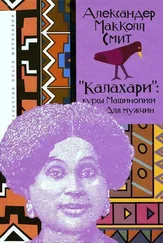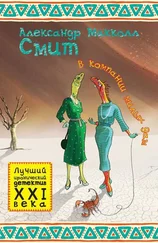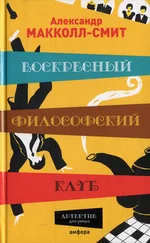‘The girl will bring us tea,’ said Miss Rose. ‘She will not be long. These hot afternoons make me want to drink tea.’
‘Tea is the thing,’ said Mrs. ‘It is always time for tea. Hot afternoons, cold afternoons – it doesn’t matter. Tea.’
Mma Ramotswe listened to the voice. It was hard to place the accent – and she felt that she was never very good at that anyway – but the voice did not sound at all out of place. Sometimes when people had recently arrived from India she noticed that they spoke in what struck her as a rather pleasant, slightly musical way. This woman, though, seemed to speak in much the same accent as that of Miss Rose. For a few moments her thoughts wandered. If you lost your memory, why did you not lose your vocabulary, too? Surely words were a memory, just like the things that happened to you? And how would you still remember things like how to turn on a light or boil a kettle? How would you remember that tea is just the thing if you had forgotten everything else?
These thoughts were interrupted by Miss Rose. ‘Mrs is happy to answer any questions you have, Mma Ramotswe. That is so, isn’t it, Mrs?’
Mrs inclined her head. ‘I am very happy that these excellent ladies may be able to help me find out who I am. I shall certainly answer their questions, although…’ She left the sentence dangling.
‘Although you can remember nothing?’ supplied Mma Makutsi.
‘Exactly,’ said Mrs. ‘It is all a blank. There is nothing there. It is as if I had started to live a few days ago, only.’
Mma Ramotswe noticed the use of the word only . It was a speech pattern she had noticed in people from India: for some reason they liked the word only , just as people from other places had a fondness for certain words or expressions. The South Africans often said yes and no in quick succession – yes, no – or they said hey a lot at the end of sentences. And the Americans, she had noticed, had a fondness for the word like , which was dropped into their pronouncements for no particular reason. It was all extremely odd. But then, she thought, did we all want to speak the same way? No, that would be too dull, like hearing the same song all the time; one song, on and on, day after day.
‘When exactly was that?’ asked Mma Ramotswe.
‘It was about two weeks ago,’ said Mrs, looking to Miss Rose for confirmation.
‘Yes,’ said Miss Rose. ‘Two weeks ago today.’
‘So you do remember some things,’ said Mma Ramotswe.
‘I remember what happened recently,’ said Mrs. ‘I don’t remember what happened before I arrived at the house of these kind people.’ She nodded towards Miss Rose, who acknowledged the appreciation with a smile.
Mma Makutsi was sitting on the edge of her seat, such was her eagerness to ask a question. ‘This is amazing, Mma,’ she blurted out. ‘You can’t even remember your name? What about the names of your mother and father? Can you remember them?’
Mrs frowned. Her expression was one of intense concentration. ‘I don’t think so. No, I cannot. There is nothing there.’
‘Are they still with us or are they late?’ asked Mma Makutsi.
‘Late,’ said Mrs.
There was a silence. Then Mrs spoke again, hurriedly this time. ‘Or I imagine they will be late by now.’
‘Because you are of such an age that your parents would be likely to be late?’ asked Mma Makutsi.
Mrs shrugged. ‘I do not know how old I am.’
‘Or where you went to school?’ pressed Mma Makutsi.
‘No, I do not remember that. I think I went to school because, well, I know how to write. But I do not know where this school was.’
Mma Makutsi sat back in her chair. She was staring at Mrs with some intensity now. ‘So, what is ninety-five plus two?’ she asked.
Mrs seemed momentarily taken aback, but then she answered: ‘Ninety-seven.’
Catching the light, Mma Makutsi’s glasses flashed out their message. ‘So you can do addition. So you were taught that. And what is the capital city of Swaziland?’
Mrs shook her head. ‘I do not know where Swaziland is,’ she said quietly.
‘But you do know where South Africa is? And America – do you know where America is?’
Mrs looked helplessly at Miss Rose, who glanced disapprovingly at Mma Makutsi. ‘Please, Mma. This poor lady is embarrassed about what has happened to her memory. We must not confuse her. Please.’
Mma Ramotswe realised that she would have to intervene, but before she could do so Mma Makutsi started to speak again. ‘I am not confusing her, Mma. I am trying to help her. Did you know you were in Botswana? Did you know where Botswana was?’
Mrs remained silent and now it was Mma Ramotswe who spoke. ‘I think, Mma Makutsi, that Miss Rose is right. We must not upset this poor lady with questions about the capital city of Swaziland.’ She paused, looking pointedly in Mma Makutsi’s direction. ‘I think that there are many people who do not know what the capital city of Swaziland is. I could go out there in the street and ask people and I am sure that many of them would not know.’
Mma Makutsi interrupted her. ‘But they would know where America is. They would know that, Mma.’
‘That’s not the point, Mma Makutsi. The point is that this poor lady has lost some of the things that she knew but remembered some others. It seems to me that the things she has forgotten are the things about herself, while the things that she has remembered are the things that have nothing to do with her. That is perhaps the way this strange condition works.’
‘Precisely,’ said Miss Rose, glowering at Mma Makutsi. ‘The brain is a very complex thing, Mma. If you look at a picture of it you will see all those ridges. It is like a loaf of bread that has come out of the oven very uneven. All those bumps going up and down.’
‘I have seen a picture too,’ muttered Mma Makutsi.
‘Well,’ continued Miss Rose, ‘those ridges, those bumps, are the different departments of the brain. Different matters are stored in different places. There is one section for facts and another section for feelings. There is probably a special section for love – I do not know, as I am not a brain scientist. But I am sure that there is a bit that makes you fall in love. And out of love, too. I am sure there is also a department for that.’
‘And for recipes,’ mused Mma Ramotswe. ‘Recipes have to go somewhere.’
Miss Rose agreed. ‘That would be in the part that deals with facts,’ she said. She started to smile. ‘You do not find that recipe part in men’s brains, I think. Or it is not very big in a man’s brain.’
‘Nor is the bit for helping around the house,’ offered Mrs, grinning nervously.
It was the first time they had seen her smile, and Mma Ramotswe responded warmly. ‘Oh, that is very true, Mma. Poor men. No, you are very right about that, Mma.’
The tension that had grown up around the discussion of the capital of Swaziland seemed to dissipate. The maid, a young woman barely out of her teens, brought in a tray and laid it down on the table.
‘You have forgotten the sugar,’ said Miss Rose crossly. ‘Go and fetch it now now.’
The maid scurried out of the room, Mma Ramotswe’s eyes following her.
‘That girl,’ said Miss Rose as she began to pour the tea. ‘That girl is always forgetting things.’
‘Perhaps it’s catching,’ said Mma Makutsi with a smirk.
Miss Rose put down the teapot and looked at Mma Ramotswe. ‘As long as tactlessness isn’t catching, too,’ she said. ‘That would not be a good thing, would it?’
Mma Ramotswe forced herself to smile. ‘Well, here is the tea, then. I am sure that it will be very good. And then I think we shall have to get back to the office. Mma Makutsi and I have correspondence to catch up on – it is always such a chore, but we have to do it.’
Читать дальше







![Александр Макколл Смит - Отдел деликатных расследований [litres]](/books/397661/aleksandr-makkoll-smit-otdel-delikatnyh-rassledova-thumb.webp)




